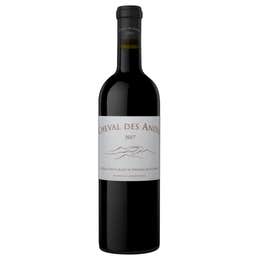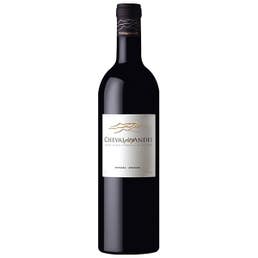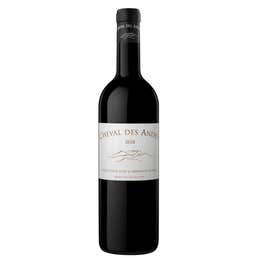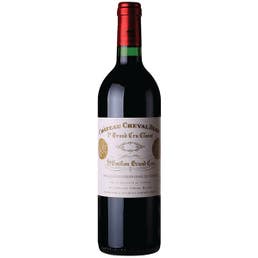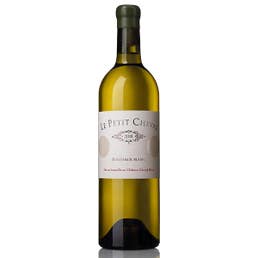Cheval des Andes 2016
• Domaine: Cheval des Andes
• Appellation: Mendoza
• Origin: Argentina
A “Grand Cru” from Argentina
Cheval des Andes is the result of a joint venture between Château Cheval Blanc (Premier Cru Classé A, Saint-Emilion) and Terrazas de Los Andes, a pioneer of cool-climate, high-altitude winemaking in Argentina.
The story of this union began in the late 1990s when Pierre Lurton, the president of Château Cheval Blanc, was in search of pristine Malbec vines. Finding these vines was a form of connecting to the origins of Bordeaux. For context, most of France’s Malbec was eradicated by the devastating phylloxera outbreak in the 1860s. Fortunately, many of these plantings were saved because of a practice called “grafting,” but the identity of this grape would be forever changed. Because of this, Pierre Lurton set his sights on Argentina, the one country home to a sea of ungrafted and unaltered Malbec vines. After discovering the Malbec vineyard Las Compuertas at the foot of the Andes Mountain range, Pierre knew he had stumbled upon something extraordinary.
Though Cheval des Andes has achieved the milestone of its 20th vintage, the estate’s history is a long one. In the 1850s, the French transported plantings of Malbec vines from Bordeaux to Argentina, and these cuttings thrived in the country’s warmer temperatures and extreme terroir. The cuttings of Malbec were spared from the French phylloxera outbreak at the turn of the century that nearly eradicated the Malbec vines in Bordeaux. The Las Compuertas vineyard was one property in the prestigious Luján de Cuyo region that would be planted with old Malbec in 1929. Seventy years later, these vines captured Pierre Lurton’s attention, inspiring him to create a wine that would uncover the origins of Bordeaux.
The name “Las Compuertas” means “The Floodgates,” which is an homage to the irrigation methods used by the Incan people who were indigenous to this region. They would typically use a snowpack to water the vines from the Andes Mountain range. Interestingly, this method drowned phylloxera pests, which may be why most old vine Malbec was spared from the devastating outbreak that affected the rest of the world. The team at Cheval des Andes has refined this practice, collecting the snowpack from the Andes Mountains in snow reservoirs and then using it to irrigate the vines at this "Grand Cru" vineyard at the base of the Andes Mountains. They ensure that each parcel is planted in perfectly compatible terroir and harvested at the optimum date to ensure freshness. The Petit Verdot is imported directly from Château Margaux prior to being added to the final blend, depending on the vintage.
Located in one of the most renowned regions of Luján de Cuyo, in the north of Mendoza, Cheval des Andes spans 50 hectares. The richness of this exceptional terroir at the foot of the Andes mountain range enables the vineyard to cultivate two grape varieties: Malbec and Cabernet Sauvignon.
Cheval des Andes wine is a blend of Malbec, Cabernet Sauvignon, and Petit Verdot, which may sometimes be added depending on the vintage. This combination captures the intensity of Argentinian terroir mixed with the rigor, savoir-faire, and elegance of a great Bordeaux. Cheval des Andes creates the Grand Cru of the Andes, distinguished by freshness, elegance, and exceptional aging potential.
The winemaking team crafts the finest possible expression of this unique terroir in a given year. Cheval des Andes wine is unique in Argentina as it reveals the freshness and elegance of the terroir through blends inspired by Cheval Blanc with cellaring potential and complexity. On the nose, they are complex, and on the palate, they reveal rich red fruit flavors that are smoothly blended with coffee and spices. The wine has a silky texture and delicious finish.
The Cheval Blanc team started a biodiversity project on the property, ensuring that local birds and bees are attracted to their vineyards. After the vines are harvested by hand, they implement the vinification process, ensuring the final blend is nothing short of perfection. Cheval des Andes favors elegance and restraint over power and bold fruit, making it a stylistically unique wine from Argentina and a leader in the region.
Tasting Notes
''Immediately seductive floral and smoke notes. The complexity in the construction of the wine is clear - precise cassis and blueberry along with slate, scorched earth and the seductive, succulent and powerful spice of Malbec. Excellent quality, with liqourice root and violet curling out of the glass. First year with 100% of grapes from their own plots, entirely given over to Cheval des Andes, without any from Terrazas de los Andes. Lorenzo Pasquini winemaker. 70% new oak.'' Jane Anson, Best Pomerol 2020 Wines Tasted En Primeur (07/18/2021) Ratings: 98 Drink: 2021-2042
"I also tasted the 2015 and 2016 next to the newly released 2017 to give it some context and to see the evolution and changes implemented in the last few years. The 2016 Cheval des Andes is probably the freshest wine produced to date and the first vintage when they used 100% own grapes. Of the trio of vintages tasted together—2015, 2016 and 2017—this is the one with less alcohol and more freshness, and it remains a more austere expression, reflecting a cooler and wetter year that resulted in a less exuberant wine, a benchmark for freshness. I'm looking forward to 2018 to see where they go in the next cool vintage after this 2016... They produced 60,000 bottles and 2,400 magnums. It was bottled in December 2017." - Luis Gutiérrez, Robert Parker's Wine Advocate (8/31/20202), Ratings: 97+, Drink: 2020-2035
| LWIN | 2909015 |
|---|---|
| Stock Status | Out of Stock |
| Appellation | Mendoza |
| Vintage | 2016 |
| Brand | Château Cheval Blanc |
| Shipping Weight | 3.000000 |




